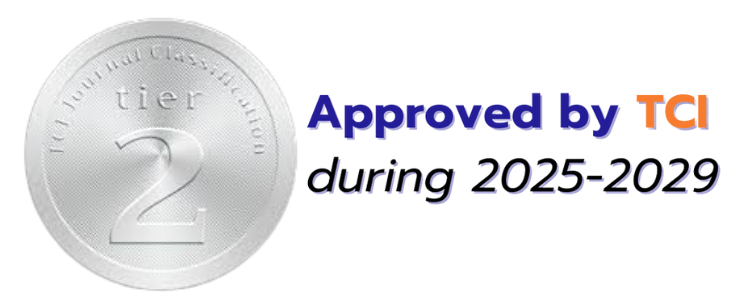การพัฒนาแรงจูงใจในการเรียนและผลสัมฤทธิ์ทางการเรียนคณิตศาสตร์ด้วยการจัดการเรียนรู้โดยใช้แนวคิดเกมมิฟิเคชันของนักเรียนระดับชั้นมัธยมศึกษาปีที่ 3 |
Developing Learning Motivation and mathematics achievement with learning management using Gamification concept of student in mathayom Suksa 3
Keywords:
แนวคิดเกมมิฟิเคชัน, แรงจูงใจในการเรียนคณิตศาสตร์, ผลสัมฤทธิ์, Gamification concept, Motivation for learning mathematics, AchievementAbstract
การวิจัยครั้งนี้มีวัตถุประสงค์ เพื่อศึกษาแรงจูงใจในการเรียนคณิตศาสตร์ของนักเรียนระดับชั้นมัธยมศึกษาปีที่ 3 ต่อการจัดการเรียนรู้โดยใช้แนวคิดเกมมิฟิเคชัน และเพื่อเปรียบเทียบผลสัมฤทธิ์ทางการเรียนคณิตศาสตร์ก่อนและหลังด้วยการจัดการเรียนรู้โดยใช้แนวคิดเกมมิฟิเคชัน ของนักเรียนระดับชั้นมัธยมศึกษาปีที่ 3 โดยมีกลุ่มตัวอย่าง คือ นักเรียนระดับชั้นมัธยมศึกษาปีที่ 3 ห้อง 7 ภาคเรียนที่ 1 ปีการศึกษา 2565 โรงเรียนกรรณสูตศึกษาลัย จังหวัดสุพรรณบุรี จำนวน 45 คน ได้มาจากการสุ่มแบบกลุ่ม (Cluster Random Sampling) โดยมีเครื่องมือที่ใช้ในการเก็บรวบรวมข้อมูลในการวิจัยครั้งนี้ ประกอบด้วย (1) แผนการจัดการเรียนรู้โดยใช้แนวคิดเกมมิฟิเคชัน รายวิชาคณิตศาสตร์เพิ่มเติม เรื่อง สมการกำลังสองตัวแปรเดียว จำนวน 9 แผน (2) แบบวัดแรงจูงใจในการเรียนคณิตศาสตร์ และ (3) แบบทดสอบวัดผลสัมฤทธิ์ทางการเรียนคณิตศาสตร์ เรื่อง สมการกำลังสองตัวแปรเดียว แบบปรนัย จำนวน 20 ข้อ ซึ่งผ่านการพิจารณาค่าดัชนีความสอดคล้อง (IOC) พบว่าได้ตามเกณฑ์ตั้งแต่ 0.5 ขึ้นไป มีค่าดัชนีความยากง่ายระหว่าง 0.2 – 0.8 มีค่าดัชนีอำนาจจำแนกตั้งแต่ 0.2 ขึ้นไป และพบว่ามีค่าความเชื่อมั่น 0.86 ซึ่งสามารถเชื่อมั่นได้ในระดับสูง สำหรับการวิเคราะห์ข้อมูล ผู้วิจัยได้ทำการวิเคราะห์ข้อมูลด้วย ค่าเฉลี่ยเลขคณิต ส่วนเบี่ยงเบนมาตรฐาน และสถิติ t-test for dependent samples ผลการวิจัยสรุปได้ว่า 1) ผลการศึกษาแรงจูงใจในการเรียนคณิตศาสตร์ของนักเรียนระดับชั้นมัธยมศึกษาปีที่ 3 ต่อการจัดการเรียนรู้โดยใช้แนวคิดเกมมิฟิเคชัน อยู่ในระดับสูง 2) ผลสัมฤทธิ์ทางการเรียนคณิตศาสตร์ด้วยการจัดการเรียนรู้โดยใช้แนวคิดเกมมิฟิเคชัน ของนักเรียนระดับชั้นมัธยมศึกษาปีที่ 3 หลังเรียนสูงกว่าก่อนเรียนอย่างมีนัยสำคัญทางสถิติที่ระดับ .01
The purposes of this research were to: 1) study the motivation for learning mathematics after learning by using Gamification concept; 2) compare the mathematical learning achievement in quadratic equations with one variable of student in mathayom Suksa 3before and after learning by using Gamification concept. The sample group was 45 students from mathayom Suksa 3 class 7 enrolling in the first semester of academic year 2022 at Kannasootsuksalai School in Suphan Buri Province, derived by cluster random sampling. The research instruments were: (1) learning management plans based on Gamification concept, totaling 9 plans; (2) a questionnaire for motivation in learning mathematics; (3) an achievement test in quadratic equations with one variable, multiple choice, 20 items for analysis. Which passed the consideration of the Index of Item-Objective Congruence (IOC) of 0.5 or higher, had an index of difficulty between 0.2 and 0.8, had an index of discrimination from 0.2 or higher and found that it had a reliability value of 0.86, which could be a high level of reliability. The data were analyzed using arithmetic mean, standard deviation and t-test for dependent samples. The results of this research were; 1) the students’ motivation for learning mathematics regarding after learning by using Gamification concept was at a high level; 2) the mathematical learning achievement in quadratic equations with one variable of student in mathayom Suksa 3 after learning by using Gamification concept was significantly higher than that of before with statistical significance at .01 level.







